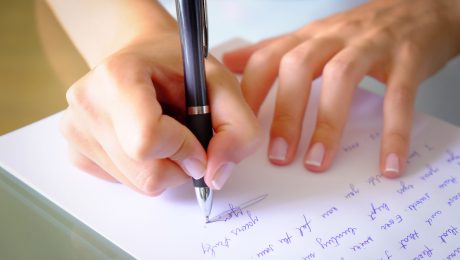What Do You Do When A Car Dealer Forges Your Signature?
Use car salesmen often get a bad rap. And, for good reason. The automotive dealer industry is filled with the lowest form of salesmen and often has very low margins to work with. While it might seem like a “good deal”, the extra that you don’t know you are paying for is very profitable for both new and used car salesmen.
But, even if you get a good deal… what happens when you get a lemon?
First, you probably signed away most of your rights when you drive off the lot. Secondly, even the paperwork you didn’t sign… someone else could have signed your name. You won’t find that out until you sue them for the repairs the car required that were hidden from you.
It can be a scary thought to think that someone could forge your signature and claim it was you later in court.
But it is also very possible. In fact, it happens all the time in every state. Automotive dealerships are often in court defending paperwork that a customer did or did not sign? Did you buy that extended warranty? Did you see the Carafe? Your signature is on the paper… so it must be true.
In this blog post, we will discuss why signatures are so important and how you can avoid being a victim of forgery.
Signatures have been used for centuries as a way of signaling consent and decision-making authority. They continue to play an important role today not just in contracts or financial agreements but also in legal agreements such as wills or powers of attorney. In fact, many people believe that they do not need to worry about their signatures being forged.
However, this is a dangerous belief to have. In the United States alone, it is estimated that signature forgery results in losses of billions of dollars every year. This is because forged signatures can be used to commit all sorts of fraud, from taking out loans in another person’s name to falsifying tax returns.
It is also very common when buying a car. Car dealers sometimes forge documents to avoid actually disclosing that the vehicle you’re about buy is damaged in some way. Car dealers may also forge your name to make more money and reduce their own liability.
In Maryland, a car dealership was forging customer names on documents to cancel gap insurance for a customer. When the customer got into an accident and totaled her car, the insurance company did not give her enough money to repay the bank. Thus the customer called the gap insurance company to cover the difference.
When the customer called the gap insurance company, they informed her that she did not have any coverage. A few days after the customer bought the car, the dealership called the gap insurance company and canceled the coverage. The dealership used the money that the customer paid for the gap insurance to make more money on her car purchase.
It happens all the time.
So how do you prevent these kinds of forgeries when buying a car? Here are 3 easy tips.
1. Sign your full name clearly and legibly. Do not use a symbolic or simplified signature. It might take 5 minutes longer, but it will be much hard to forge and dealerships will NOT attempt it unless your signatures are a bunch of squiggles.
2. When you sign any paperwork, take out your mobile phone and take a clear full photograph of the paperwork before you hand it over to the dealership. This will be your life-saver. Take a photo of the pages you did NOT sign, too.
3. If you are buying a car, call the bank or the lending institution a few days after you buy the car to make sure that the paperwork the lending institution has, matches your paperwork.
If their paperwork doesn’t match what you have, then perhaps someone forged your documents. Make sure that the monthly payment, interest rate, amount financed, and other terms of the loan that the finance company received match the terms you agreed to. Even if the monthly payment is off by a few cents, it may mean that someone changed the terms and forged your signature on a new document.
If a document was forged, you may need to hire a Forensic Document Examiner to prove that your signature was forged.
This article was written by Brett Goldstein and Bart Baggett. Both are court-qualified forensic handwriting experts and have dealt with both clients and dealerships in forgery cases. Call today to discuss your car dealership forgery case.
- Published in Criminal Cases
How To Spot a Forgery
How To Spot a Forgery
Perhaps this can be explained using a well-known example from television.
If you haven’t heard of or seen the Netflix documentary, ‘Tiger King: Murder, Mayhem, and Madness’, it is a seven-part docu-series that follows people who own private zoos. These zoo owners have large animals like Lions, Tigers, Cougars, and more. The show documents the zoo owners, their interaction with other zoo owners, and their treatment of the animals.
One zoo owner is named Carole Baskin. The show often featured her and the mysterious disappearance of her multi-millionaire husband Jack Donald ‘Don’ Lewis.
After watching the show, fans had questioned whether Carole had any involvement in the sudden disappearance of her husband and whether she forged Don’s name on a Will and on a Power of Attorney.
Since the show aired and gained popularity, www.HandwritingExpertDallas.com has stated that the Will and the Power of Attorney were indeed forged.
How is a Handwriting Expert able to tell that something is forged? Handwriting is unique to each person, and no two individual’s handwriting will be identical. Because of this, every person’s handwriting is as unique as a fingerprint.
www.HandwritingExpertDallas.com compared the Will and the Power of Attorney to other known documents of Don Lewis. Both documents had signs of forgery which include tremors, pen lifts and hesitations, and slow speed.
The two Handwriting Experts who reviewed the documents after the show gained popularity, had each concluded Don Lewis’ signature appeared to have been “traced” from his 1991 marriage record.
If you are working with a document that you think maybe forged or traced, contact us today and ask for Megan L. https://handwritingexpertdallas.com/contact/.
- Published in Criminal Cases, Handwriting Analysis




